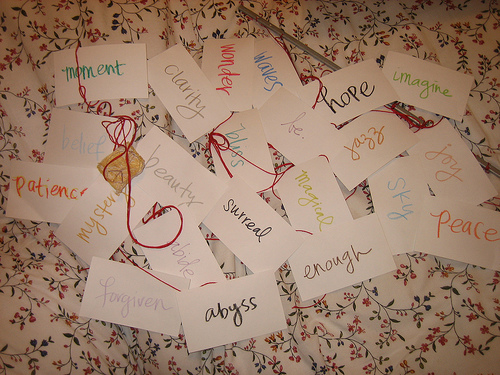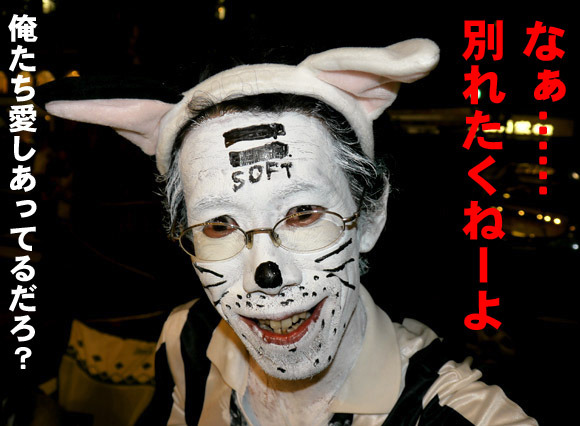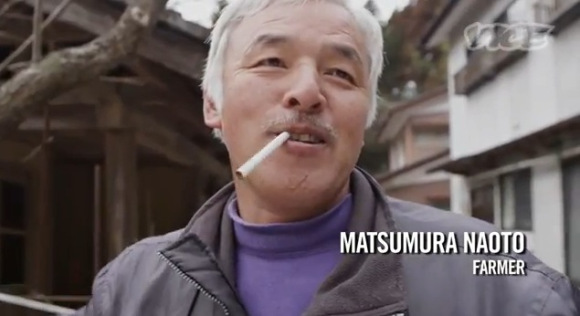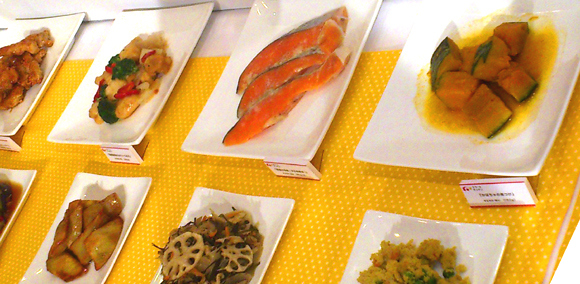A research team, whose major investors include some of the biggest telecommunications companies in Japan, has announced that it has successfully deciphered the contents of human dreams with high precision by analyzing the human brain’s activity during sleep.
Posted by Andrew Miller (Page 5)
At around 10 a.m. on April 2, a man living in the town of Fukuchiyamashi, Kyoto called the police after he discovered that the light of a nearby parking lot had been vandalized with white spray-paint. Upon arriving at the scene, officers also discovered that an expensive, multi-function toilet had been stolen from a park located nearby.
How many of you have ever heard of the Japanese word ‘wasei eigo’? A direct translation into English would be “Japanese-made English”, but put more simply the word refers to English words that, after a little tampering, have been adopted into the modern Japanese lexicon and used on an everyday basis. Despite having their origins in English, wasei eigo words often have quite different meanings to those on which they are based. Consequently, Japanese visitors to English-speaking countries using terms like “baby car” and “key holder” — words that are thought to be “English” in Japan — are often met with raised eyebrows and blank stares from native English speakers.
So come with us now as we look at the top 20 wasei English words that cause Japanese people trouble when they break them out while abroad.
The Chinese government announced on March 31 that two men from Shanghai have died from a variant of bird flu known as H7N9. It is the first time transmission of this type of bird flu has been confirmed in human beings. After contraction of the virus, both men showed symptoms of pneumonia.
The Chinese Health Authorities announced that the 87 and 23-year-old men first showed symptoms of a fever, pneumonia and similar characteristics in March of this year. The 87 and 27-year-old-men died on 4th and 10th of this month respectively.
Shortly afterwards, a detailed inspection into their deaths was carried out where it came to light that both men had been infected with the H7N9 strain of the bird flu virus. It has also been confirmed that a woman in the eastern province of China, Anhui, has been infected with the same strain of bird flu. Her current condition is critical, exhibiting identical symptoms of pneumonia, however the woman is said to be receiving medical treatment.
Read More
In recent years there has been a dramatic change in attitudes towards smoking in public places in Japan. While it was a common sight to see someone walking along the street with a cigarette in their hand until a few years ago, nowadays it is becoming increasingly rare to see. It is fair to say that smokers have adopted a much politer approach to smoking in public. The movement towards a smoke-free environment is one welcomed by many, however accompanied by this is the tendency to drive smokers into corners and ostracize them for lighting up. Anti-smokers are increasingly pushing forward their demands, seeing a pollution-free environment as part of their right to a healthy lifestyle. But is it going too far?
Tokyo District Public Prosecutor’s Office officially announced that it intends to prosecute cyclists who repeatedly violate road traffic laws in Japan. Ignoring a red light or not stopping when necessary may also become subject to penalty, with a three-month jail sentence or a fine of up to 50,000 yen. In addition, riding parallel with other cyclists or failure to make use of one’s light under conditions of poor visibility could carry fines of up to 20,000 yen and 50,000 yen, respectively.
Below is an account from Sayaka, a reporter over at our sister site Pouch. It is an intriguing look at differences in business culture between Japan and the west. It makes one realize that there is no perfect business strategy as such but by incorporating the best parts from each culture, one can get pretty close to their own perfect business model. Moreover, Japan’s business culture has to be one of the most unique in the entire world.
“Hey, there’s no way I’m splitting with you, babe. After all, we’re supposed to be lovers, right?”
Moving words from our own Mr. Sato there, but perhaps relationships aren’t always quite so straightforward? What if, for example, you feel that the relationship you’re trapped in has all the passion and energy of a punctured party balloon, while your partner is still penning sonnets and writing messages in fire outside your window? There’s no easy way to tell them that it’s over. Or is there? One 23-year-old Tokyoite thinks she may have stumbled upon a powerful, if slightly disgusting, method.
After the great earthquake and tsunami that came with the calamities of March 11 2011, many residents to the Kanto region of Japan experienced turmoil on an unprecedented scale. If natural disaster wasn’t enough, there was also the explosion at the Fukushima nuclear plant, spreading radioactive contamination even as far as Tokyo. Now after two years, Fukushima’s 20-kilometer radioactive exclusion zone still remains in place.
While most families fled the contaminated areas in the early stages following the explosion, one brave man remained undeterred by it all, staying put in his hometown. Naoto Matsura (53) is believed to be the sole inhabitant within the 20-kilometer red zone.
Matsumura’s determination to remain rooted in the same place and see through the nuclear catastrophe has caught the attention of many, with his accounts even being adapted into a documentary. The documentary tells of the events after the great earthquake and Mutsumura’s reasons for remaining at his home despite all those around him fleeing, never to return. Perhaps even more interestingly, it gives some rather candid accounts of this man’s feelings towards Tokyo Electric Power Company (TEPCO), the company that operated the stricken Fukushima Daiichi Nuclear Power Plant.
OK, hands up: how many of you have ever paid a visit to North Korea? For purposes of photography, our man Kuzo recently found himself crossing the border into what is admittedly a country that differs in many respects to anything many of us have ever seen before. While he was there, he kept a list of things that stood out, impressed and downright confused him. Our reporter’s top 10 awesome things about North Korea after the break.
It has come to light that the Japanese government’s Fukushima Daiichi cleanup plan is failing due to problems concerning counterfeit contracts. The government is now left reassessing its human resource strategy and considering how to effectively secure the number of employees required to carry out the work. As it presently stands, more than half of the laborers employed at the nuclear site are suspected of being involved in counterfeit contract work.
On March 6, the Osaka edition of the Asahi Shinbun published an article which featured a single mother of two from Japan who was in receipt of a 290,000 yen (about $3,000) monthly social security allowance. Despite this hefty amount of cash arriving in her bank account each month, though, she was alarmed to hear that her benefits may be cut in the near future.
Japanese electronics maker Sharp has in recent years seen a slump in sales. What is arguably required for the company to remain afloat in this tough consumer market is a change in business strategies. As one of Japan’s most renowned sellers of liquid crystal displays, Sharp is hastily searching for ways to revamp its administration.
First there was talk of a possible alliance between Sharp and Taiwanese major electronic company Hon Hai Precision Industry Co., Ltd. However, coming to a deadlock in investment negotiations, Sharp changed course by forming an alliance with a company that was arguably up until now its biggest competitor on the market, South Korea’s Samsung Electronics Co. It was announced this week that a capital alliance between the two companies is in its final stages of negotiation.
In Japan, pachinko – a game similar to pinball but with multiple balls in play and minus the flippers – has always been a big business. “Pachinkoten” (dedicated pachinko parlors) have become about as commonplace as temples and hot springs, and it’s not uncommon to see small crowds of men waiting outside such establishments early in the morning, waiting for them to open.
A phenomenon that is particularly noticeable in recent years is that of the large numbers of Koreans coming to Japan to gamble. Up until seven years ago, Korea’s pachinko industry was booming. However, when gambling laws were introduced to combat the recent rise in addictions, many players were left out in the cold with nothing to fill the gap. But with a thriving pachinko scene just a couple of hours away on the plane, many Koreans are heading to Japan to pick up where they left off.
The Japanese word “karoushi”, meaning “death from overwork”, is a term that has gained recognition across the globe and is arguably testimony to the zeal with which many Japanese people carry out their work. Westerners observing Japan’s high standard of living and yet long labour hours often struggle to fully comprehend the Japanese mindset. The prevailing ideology for many in the west is that we “work to live”, in Japan, however, many appear to live to work.
Solitary Non-Employed Persons is a term that perhaps many are unfamiliar with. It defines those who are unemployed and, if you exclude relatives, those without any ties in society. These ‘without occupation or social network’ wanderers are referred to in short as “SNEPs”. More specifically, the term can be applied to anyone of the working age 20-59 years who is not enrolled in education, is unemployed, unmarried and has no ties outside of one’s family. And according to reports online, Japan is witnessing a sudden increase in these such people.
Just spending a few minutes on the train, it is possible to gain quite an insight into the type of people who use public transport; whether it be the guy crashed out after a heavy night of drinking with his pals, the student listening to his music player on full blast, or the person completely immersed in their favourite book, the types of behavior are varied to say the least.
The inside of the train carriage is a rather peculiar environment in that, on the one hand, it is a public space in which one must abide at least to some degree by the rules of proper public conduct. However, it also provides us with our own private space in which to shut off everything around us and relax while travelling.
By observing the way in which people spend their time on the train, however, we can learn a lot about an individual’s personality, claims Tsugumi Tachibana, a Japanese counselor in love relations. From a romance perspective, Tachibana analyzes in-depth the correlation between public behavior and personality traits. Her findings can be found below and might just help us learn a little more about that one special person on the train or bus that you’ve been admiring from afar.
When it comes to preparing a gourmet meal you can be proud of, an investment of time and a good recipe book are often required. If you’re a busy parent or living alone while working full time, just dashing out to gather the ingredients — not to mention actually preparing the meal — can prove rather time consuming and, let’s admit, a little bothersome.
The intricacies of it all leave many abandoning hope, opting for the greasier ‘ready prepared’ meal option or dining out at a local restaurant. But even those who do make the effort to cook have probably found themselves saying “This just doesn’t have the same impact as the dish I tried at the restaurant the other day,” every so often. If only there were a way to replicate the same taste at home!
If you live in Japan, a collaboration between convenience store chain Lawson and Yahoo! (yes, that Yahoo!) may be the answer to your culinary conundrums: a new home delivery service that offers not ready-to-eat meals, but rather a combination of ready-to-cook dishes that can be thrown together to create a tasty meal of your own.
Recent reports from Radio France Internationale (RFI)’s Chinese site suggest that China’s pollution problem is raising serious concerns within the country itself. In the push for economic growth, the China is also becoming increasingly aware of what could potentially develop into a serious problem if steps are not taken soon. In this connection, there has been heated debate on the Internet suggesting that Chinese authorities are proposing moving the capital away from Beijing.
When it comes to reading famous literary works whose copyright license has expired, there is one piece of software that is renowned for doing the job rather well. It goes by the name of “Aozora Bunko” and is a digital contents reader available on a wide variety of devices; there’s even a version available for smart phone users. It is currently host to a plethora of copyright-free material rich in Japanese history and culture. What’s particularly exciting is that the more time goes by, the more the library of works can be seen to grow.
Anyone with an interest in old Japanese masterpieces – and can read Japanese – will surely be lureRemove featured imaged in by what this software has to offer. In this connection, on January 1 this year, the legendary writer Eiji Yoshikawa’s work “Miyamoto Musashi” is also set to be added to the collection. Miyamoto Musashi is a bestselling novel depicting the life of legendary samurai Musashi Miyamoto, who actually existed during the Japanese Edo era.
Just what makes all this free content possible is the rule that governs copyright licensing laws: 50 years after an author has passed away, copyrighted works are released freely into the public domain.





 Japan Extreme Budget Travel! A trip from Tokyo to Izumo for just 30,000 yen [Part 1]
Japan Extreme Budget Travel! A trip from Tokyo to Izumo for just 30,000 yen [Part 1] The results are in! One Piece World Top 100 characters chosen in global poll
The results are in! One Piece World Top 100 characters chosen in global poll It’s naked time: An American’s first onsen experience 【Video】
It’s naked time: An American’s first onsen experience 【Video】 Is a weekend trip to Korea possible with just 50,000 yen (US$350)? – Part 1【Extreme budget travel】
Is a weekend trip to Korea possible with just 50,000 yen (US$350)? – Part 1【Extreme budget travel】 Majority of Japanese women in survey regret marrying their husband, but that’s only half the story
Majority of Japanese women in survey regret marrying their husband, but that’s only half the story Step back in time with Japanese-themed rooms at rare vintage love hotel in Osaka【Video】
Step back in time with Japanese-themed rooms at rare vintage love hotel in Osaka【Video】 Japanese supercomputer finds the reason some baseball pitches can suddenly drop near home plate
Japanese supercomputer finds the reason some baseball pitches can suddenly drop near home plate Brand-new Cardcaptor Sakura Cafe opens in Tokyo this week, with Kero-chan calling the shots
Brand-new Cardcaptor Sakura Cafe opens in Tokyo this week, with Kero-chan calling the shots Take a trip to Japan’s Dododo Land, the most irritating place on Earth
Take a trip to Japan’s Dododo Land, the most irritating place on Earth Room 404: What happened when we stayed in an unlucky hotel room in Japan
Room 404: What happened when we stayed in an unlucky hotel room in Japan The 10 most annoying things foreign tourists do on Japanese trains, according to locals
The 10 most annoying things foreign tourists do on Japanese trains, according to locals Starbucks Japan releases new sakura goods and drinkware for cherry blossom season 2026
Starbucks Japan releases new sakura goods and drinkware for cherry blossom season 2026 Is Sapporio’s Snow Festival awesome enough to be worth visiting even if you hate the snow? [Pics]
Is Sapporio’s Snow Festival awesome enough to be worth visiting even if you hate the snow? [Pics] Japan has trams that say “sorry” while they ride around town…but why?
Japan has trams that say “sorry” while they ride around town…but why? Tokyo Skytree turns pink for the cherry blossom season
Tokyo Skytree turns pink for the cherry blossom season Highest Starbucks in Japan set to open this spring in the Tokyo sky
Highest Starbucks in Japan set to open this spring in the Tokyo sky Japan’s new “Cunte” contact lenses aren’t pronounced like you’re probably thinking they are
Japan’s new “Cunte” contact lenses aren’t pronounced like you’re probably thinking they are Shibuya Station’s Hachiko Gate and Yamanote Line stairway locations change next month
Shibuya Station’s Hachiko Gate and Yamanote Line stairway locations change next month Yakuzen ramen restaurant in Tokyo is very different to a yakuza ramen restaurant
Yakuzen ramen restaurant in Tokyo is very different to a yakuza ramen restaurant Starbucks Japan adds new sakura Frappuccino and cherry blossom drinks to the menu
Starbucks Japan adds new sakura Frappuccino and cherry blossom drinks to the menu Japan’s newest Shinkansen has no seats…or passengers [Video]
Japan’s newest Shinkansen has no seats…or passengers [Video] Foreigners accounting for over 80 percent of off-course skiers needing rescue in Japan’s Hokkaido
Foreigners accounting for over 80 percent of off-course skiers needing rescue in Japan’s Hokkaido Super-salty pizza sends six kids to the hospital in Japan, linguistics blamed
Super-salty pizza sends six kids to the hospital in Japan, linguistics blamed Starbucks Japan unveils new sakura Frappuccino for cherry blossom season 2026
Starbucks Japan unveils new sakura Frappuccino for cherry blossom season 2026 Foreign tourists in Japan will get free Shinkansen tickets to promote regional tourism
Foreign tourists in Japan will get free Shinkansen tickets to promote regional tourism Naruto and Converse team up for new line of shinobi sneakers[Photos]
Naruto and Converse team up for new line of shinobi sneakers[Photos] Is China’s don’t-go-to-Japan warning affecting the lines at a popular Tokyo gyukatsu restaurant?
Is China’s don’t-go-to-Japan warning affecting the lines at a popular Tokyo gyukatsu restaurant? Survey asks foreign tourists what bothered them in Japan, more than half gave same answer
Survey asks foreign tourists what bothered them in Japan, more than half gave same answer Japan’s human washing machines will go on sale to general public, demos to be held in Tokyo
Japan’s human washing machines will go on sale to general public, demos to be held in Tokyo Starbucks Japan releases new drinkware and goods for Valentine’s Day
Starbucks Japan releases new drinkware and goods for Valentine’s Day We deeply regret going into this tunnel on our walk in the mountains of Japan
We deeply regret going into this tunnel on our walk in the mountains of Japan Studio Ghibli releases Kodama forest spirits from Princess Mononoke to light up your home
Studio Ghibli releases Kodama forest spirits from Princess Mononoke to light up your home Major Japanese hotel chain says reservations via overseas booking sites may not be valid
Major Japanese hotel chain says reservations via overseas booking sites may not be valid Put sesame oil in your coffee? Japanese maker says it’s the best way to start your day【Taste test】
Put sesame oil in your coffee? Japanese maker says it’s the best way to start your day【Taste test】 No more using real katana for tourism activities, Japan’s National Police Agency says
No more using real katana for tourism activities, Japan’s National Police Agency says Step back in time with Japanese-themed rooms at rare vintage love hotel in Osaka【Video】
Step back in time with Japanese-themed rooms at rare vintage love hotel in Osaka【Video】 Japanese supercomputer finds the reason some baseball pitches can suddenly drop near home plate
Japanese supercomputer finds the reason some baseball pitches can suddenly drop near home plate Brand-new Cardcaptor Sakura Cafe opens in Tokyo this week, with Kero-chan calling the shots
Brand-new Cardcaptor Sakura Cafe opens in Tokyo this week, with Kero-chan calling the shots Take a trip to Japan’s Dododo Land, the most irritating place on Earth
Take a trip to Japan’s Dododo Land, the most irritating place on Earth Room 404: What happened when we stayed in an unlucky hotel room in Japan
Room 404: What happened when we stayed in an unlucky hotel room in Japan Muji releases ice creams with special ingredients for summer in Japan
Muji releases ice creams with special ingredients for summer in Japan Shibuya Station’s Hachiko Gate and Yamanote Line stairway locations change next month
Shibuya Station’s Hachiko Gate and Yamanote Line stairway locations change next month Daiso opens massive new 25,392-square foot Tokyo flagship store with its two sub-brands included
Daiso opens massive new 25,392-square foot Tokyo flagship store with its two sub-brands included The big biang theory! How the “most complicated” Chinese character keeps students from being late
The big biang theory! How the “most complicated” Chinese character keeps students from being late New way to buy Shinkansen tickets, through messaging app, coming this fall
New way to buy Shinkansen tickets, through messaging app, coming this fall Nintendo’s Kirby now delivering orders at Kura Sushi restaurants, but not in Japan
Nintendo’s Kirby now delivering orders at Kura Sushi restaurants, but not in Japan Japan just had its first same-month foreign tourist decrease in four years
Japan just had its first same-month foreign tourist decrease in four years